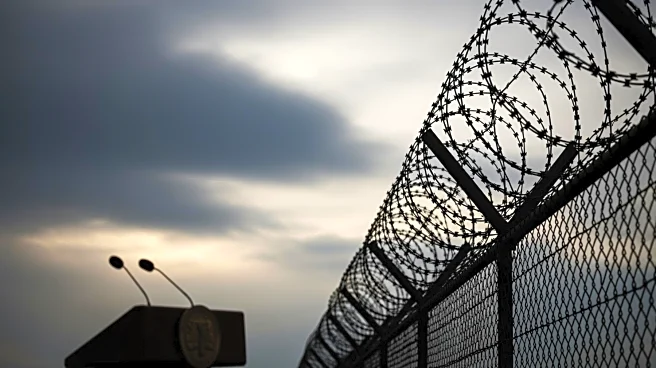What's Happening?
The ceasefire agreement between Israel and Hamas is facing challenges as the Israeli military reported that one of the bodies handed over by Hamas was not that of a hostage. This development has added
tension to the fragile truce that has paused the two-year conflict. The International Committee of the Red Cross received the remains of two more hostages from Hamas, which were to be transferred to Israeli forces in Gaza. The ceasefire plan, proposed by the U.S., called for all hostages, living and deceased, to be handed over by a deadline that expired on Monday. However, Hamas was to share information about deceased hostages and try to hand them over as soon as possible. The Gaza Health Ministry reported receiving 45 more bodies of Palestinians from Israel, bringing the total number of bodies returned to Gaza for burial to 90.
Why It's Important?
The ceasefire agreement is crucial for stabilizing the region and ending the two-year conflict between Israel and Hamas. The return of hostages and deceased individuals is a significant step in the peace process, but the misidentification of bodies could undermine trust and complicate negotiations. The exchange of hostages and prisoners is a delicate process that impacts the lives of many families on both sides. The successful implementation of the ceasefire could lead to increased humanitarian aid and support for Gaza, which has been severely affected by the conflict. However, ongoing tensions and violations of the agreement could lead to a resumption of hostilities, affecting regional stability and international relations.
What's Next?
Israel is expected to turn over more bodies, though officials have not specified how many are in custody or how many will be returned. The Red Cross and Hamas have indicated that recovering the remains of dead hostages is challenging due to Gaza's destruction. The ceasefire plan includes provisions for increased humanitarian aid to Gaza, but the timing and scale of deliveries remain uncertain. The situation is fluid, and further developments could impact the fragile peace process. Stakeholders, including international organizations and governments, will likely continue to monitor the situation closely and advocate for adherence to the ceasefire terms.
Beyond the Headlines
The ceasefire agreement highlights the complex humanitarian and ethical issues involved in conflict resolution. The identification and return of bodies involve forensic challenges, especially in areas with limited resources like Gaza. The situation underscores the importance of international cooperation and the role of organizations like the Red Cross in facilitating humanitarian efforts. The agreement also raises questions about the long-term governance of Gaza and the prospects for Palestinian statehood, which remain unresolved. The peace process could influence broader geopolitical dynamics in the Middle East, including relations between Israel and neighboring countries.









